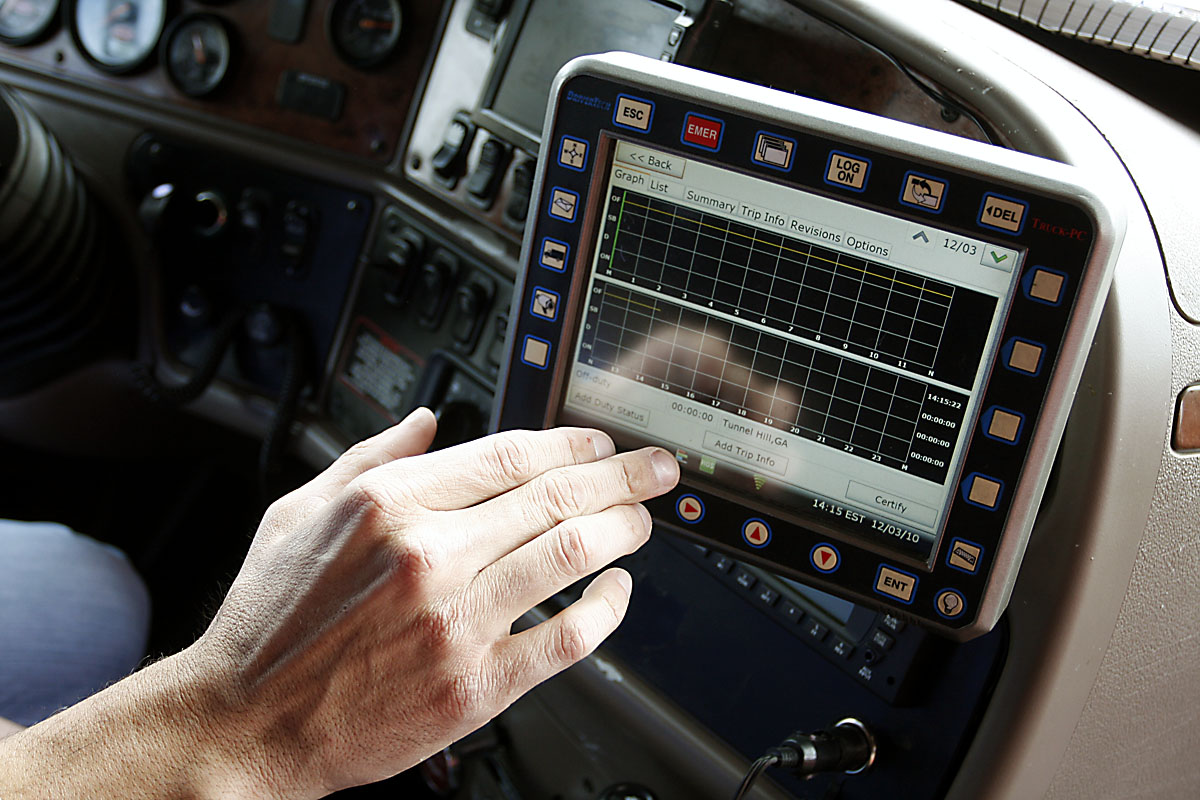 Staff Photo by Allison Carter/Chattanooga Times Free Press - Friday U.S. Express truck driver Anthony Bianculli explains the screen that tracks his last duty charge in green and what he has done for the day in yellow. The device is a more efficient way for the U.S. Express drivers like Bianculli to keep up with their time and uses less paper.
Staff Photo by Allison Carter/Chattanooga Times Free Press - Friday U.S. Express truck driver Anthony Bianculli explains the screen that tracks his last duty charge in green and what he has done for the day in yellow. The device is a more efficient way for the U.S. Express drivers like Bianculli to keep up with their time and uses less paper.U.S. Sen. Lamar Alexander, R-Tenn., is co-sponsoring a bill requiring the installation of electronic monitoring devices in all trucks within three years.
The devices are designed to replace paper logs to ensure drivers are not driving more hours than the law allows.
"This bill will save truckers time, paper and money, and it will make government leaner," Alexander said in a news release. "The Federal Motor Carrier Safety Administration estimates that in paperwork savings alone, converting to electronic onboard records would save $60 million a year."
But Eric Arnold, a former agent with the Federal Motor Carrier Safety Administration who now operates a safety consulting business in Pennsylvania, said the bill irks smaller trucking companies.
"The objection for the smaller carriers is the government is telling them how to run their business and how to spend their dollars," Arnold said.
Alexander, who is co-sponsoring the legislation with Sen. Mark Pryor, D-Ark., said in the statement that the devices aren't going to collect any information the drivers aren't already turning over. The bill was introduced Sept. 29 and has been referred to committee.
DeWayne Wilson, who runs the James Wilson trucking company in Chattanooga, said the cost of the devices would be a burden on his small business, which consists of seven trucks.
He conceded that many truckers cheat on their logbooks to drive more hours than the law allows, but he said the paper logs work.
"It's a money issue to me," Wilson said. "That's my biggest hangup."
Patrick Quinn, president of Chattanooga-based U.S. Xpress, said he contacted Alexander's office, asking him to support the legislation. According to federal campaign finance forms, Quinn has donated $5,300 to Alexander's campaigns since 2002 and thousands more to Republican candidates and committees.
Alexander's office said the contributions played no role in the senator's support of the legislation.
Greg Thompson, a spokesman for U.S. Xpress, said Alexander supports the legislation "on its merits."
Thompson said the bill also has the support of the national group, Alliance for Driver Safety and Security. But Alliance spokesman Bill Vickery said the organization was formed specifically to support the legislation, and U.S. Xpress is a member.
Quinn said about 3,000 U.S. Xpress trucks out of 5,500 already have the devices. Owner-operators are among the hold-outs against the legislation, he said, and the issue is about safety and competition.
"We want the playing field level where everybody is competing fairly," Quinn said.
There is some dispute about the cost of the devices. Quinn said they cost $400 apiece, but Wilson said it's closer to $2,000.
"The cost is the same to everybody, so I don't know how it's an unfair cost to them," Quinn said.
Tim McCorkle, who works in the operations department for Chattanooga-based Covenant Transport, said the devices make it easier to manage drivers' hours. He understands where smaller companies and truck owner-operators are coming from but said cheating isn't necessary.
"With owner-operators, they have some flexibility in terms of things they can do [without the devices]," McCorkle said.
"I can see their trepidation for not wanting to use them, but like I said, it's a nice tool to have. It's something that the industry is going to go do eventually."
Contact staff writer Dan Whisenhunt at dwhisenhunt @timesfreepress.com or 423-757-6481. Follow him on Twitter at http://twitter.com/DWhisenhunt.
